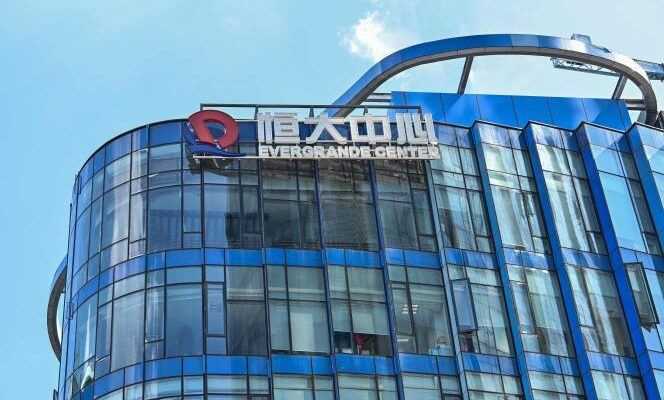Evergrande is currently avoiding payment default. The ultra-indebted Chinese promoter, whose bankruptcy could shake the country’s economy, made a payment just before a deadline, state media announced on Friday (October 22nd).
The real estate group, one of the largest in China, is dragging a slate estimated at 260 billion euros. Its financial situation is scrutinized with concern, as its potential collapse could slow the growth of the Asian giant.
With his football club Guangzhou FC, twice Asian champion and until recently coached by Italian world champion Fabio Cannavaro, Evergrande seemed a few years ago an indestructible enterprise.
But the group based in Shenzhen (southern China) is now facing an abysmal debt, interest payments to honor and deliveries of apartments that are delayed due to lack of liquidity to complete the work.
Evergrande was due on September 23 for an interest payment on dollar bonds. The payment was not made, but the company still had a one-month grace period – which ran until Saturday.
The price started to rise again
To the surprise of analysts, the promoter finally made a transfer of 83.5 million dollars (71.8 million euros) to honor this interest payment, the newspaper said. Securities Times, citing “Sources”.
Fears of Evergrande’s bankruptcy panicked international markets in September. The action of the group had plunged Thursday in Hong Kong to the resumption of quotations after two weeks of interruption. But the price started to rise again on Friday in the wake of the announcement of Securities Times, gaining nearly 5% at the start of the session.
In addition to real estate, Evergrande, sure of its financial strength, has invested in recent years in tourism, digital technology, insurance, health and even electric cars.
But worried about the build-up of debt in the real estate sector, Chinese regulators imposed on major developers last year “Three red lines”, prudential ratios aimed at reducing their recourse to borrowing. This decision marked the beginning of financial worries for Evergrande. It has struggled since to keep its activities afloat and seeks to offload assets to bail out.
The group conceded this week that it had not made significant progress in this regard, after the failure of the sale of 50.1% of the capital of one of its subsidiaries. This sale could have brought in 2.2 billion euros.
Dozens of aggrieved owners
China’s central bank ruled last week “Manageable” the risks posed by Evergrande’s indebtedness for the country’s financial system. But the concern is felt among individuals. Dozens of injured owners, not having received delivery of their apartments, as well as unpaid suppliers, demonstrated in September in front of the group’s headquarters.
This fear of social unrest could push the authorities to intervene to bail out or restructure the indebted group. Even if no clear signal has so far been given by Beijing.
Evergrande “May be able to pay that interest, and even pay more. They will have interest payments every two weeks or so ” and they do not constitute “A huge sum”, explains analyst Chen Long from Plenum in Beijing. “But at some point, beyond the interest, there will be the principal which will fall due, and this amounts to several billion dollars”, notes Mr. Chen, according to whom Evergrande plays the watch while waiting for a “Miracle” or a Beijing initiative.
The poor health of the group is only one of the symptoms of a real estate sector which has been in general seizure. New housing prices are thus down for the first time in six years, in a context of mistrust of buyers, linked to the risk of bankruptcy of several developers.
In seventy cities in China (among medium and large cities), prices were on a downward trend over one year in September, the government assured Wednesday. According to calculations by the Bloomberg agency, prices have fallen on average by almost 1%.
